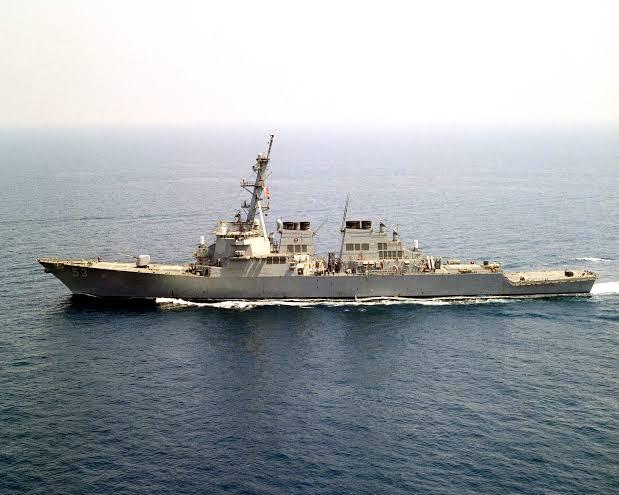GOA: The transit of the USS John Paul Jones, a destroyer named after a plucky captain of the US War of Independence, seems to have created some waves as it transited through the Indian Exclusive Economic Zone (EEZ) a few days back. Jones was famous for sailing “in harm’s way”, but has this transit created some harm?
The US and the US Navy have conducted what they term FONOPS (Freedom of Navigation operations) for decades. Essentially, these are carried out by the USN to reiterate its stand that all nations adhere to provisions of UNCLOS 1982. In recent years they have increased the frequency, especially against China, to register their non-recognition of Chinese claims which are clearly excessive and largely unjustified. Simply speaking, it is their reiteration of a rules-based international order (RBIO). At sea, RBIO’s most important manifestation and instrument is the United Nations Laws of the Seas Convention, 1982.
The Maritime Zones of India (MZI) Act of 1976 by the Indian Parliament was promulgated in an environment when discussions on the Third Laws of the Seas Convention were culminating. The final shape of the UNCLOS with rights applicable in territorial waters, contiguous zones and the EEZ had been almost formulated but not yet signed until 10 December 1982 at Montego Bay, Jamaica. It is a path-breaking, even if not a perfect convention. After tortuous discussions beginning almost right after the Second Convention in 1958, it is now one of the more equitable international agreements. For India in the 1970s, it was perhaps advisable to have anticipatory national legislation which provided for certain claims. It was also part of the reason why it was felt necessary to create a Coast Guard which also happened in 1978. As it turned out, a few smallish provisions of the (MZI) Act, 1976 were not in conformity with UNCLOS 1982. Unlike what some may believe, the right to innocent passage is applicable only in territorial waters (up to 12 nautical miles). Beyond this, the contiguous zones and EEZ are considered high seas as far as navies are concerned. If not within territorial waters, duly constituted warships (as defined in UNCLOS) need not adhere to any provisions of restrictions imposed under the right of innocent passage. In fact, exercising the right to innocent passage is among other things, an implicit recognition that the other nation recognises the territorial claims of the concerned coastal state. Thus, if any naval ship, sailing within 12 nautical miles of any of the disputed islands and reefs of the South China Seas, responds to a challenge by any Chinese maritime authority or ship by stating that it is “exercising its right to innocent passage”, it in fact ends up accepting China’s claim. The correct response is that the ship is on the high seas and executing freedom of navigation that is available under UNCLOS. There is also no requirement in UNCLOS for foreign warships to provide prior notification before transiting through territorial waters of another nation but such ships do need to maintain on innocent passage.
The MZI Act, however, requires foreign warships to give “prior notice to the Central Government” vide Clause 4 (2) to transit through territorial waters. While the Act also says the Central Government can extend provisions of territorial waters to the Contiguous Zone (the next band of 12 nautical miles width) where some rights are also applicable) as if it were “a part of the territory of India”. However, for the EEZ, the 1976 Act does not put any proviso applicable to foreign warships. What exist on this score are some reservations on UNCLOS that India had raised while filing “Declarations” at the time of signing and accession. These remain pending issues and are not reflected in any amendments carried out to MZI 1976. It is a moot point if reservations to the provisions can be considered binding on others especially when national legislation itself has not incorporated the essence of some of the reservations.
The instant case is not the first time such questions have arisen. A few aspects are certainly interesting.
The USN has needled India by declaring that it carried out FONOPS in the Indian EEZ when not mandated by either UNCLOS or the MZI itself. India’s objections related to military manoeuvres, are expressed only in the Declarations mentioned earlier. Strictly speaking, the Americans needn’t do so and neither should IN ships notify/ seek permission etc in US or anyone else’s EEZ either, unless there were mutual bilateral agreements stating otherwise. So, the USN’s notice could be called, from the Indian viewpoint, unnecessary and unfriendly. The US Department of Defense has to submit annual reports to their own Congress about FONOPS and it could have included this without wanting to trigger at least a minor furore with a media release!
Second, by notifying and thus triggering reactions, media flurry etc, a few issues do crop up. Were the US to do what is permissible under international law (RBIO), without informing, then there would be no or little “loss of face for India.” If they were to carry any weapon practice, or flying, that could possibly impact on aviation safety, or fishermen’s safety, then while having the leeway to do so under UNCLOS, informing would help notify others to their bit in keeping safely away, etc and not have unexpected incidents. Most navies do this from time to time if someone else is likely to be affected. These are all prudent measures any seafarer, especially naval seamen and aviators ought to take.
The third angle is the big one, in my view. At the highest political levels in India, rightful importance has been given to the very notion of Freedom of the Indo-Pacific and a Rules Based International Order (RBIO) clearly with China in mind especially with the territorial aggrandizement it is aiming for in the South and East China Seas. A big arena for RBIO implicitly is at sea. The focus of the Quad, Indo-Pacific framework and support for ASEAN lights up the maritime security canvas. So, India’s own departures from the purposes of RBIO may need revisiting even while the contexts under which the MZI was drafted or Declarations filed are understandable. As a budding great power, or at least as a very important middle power, India should reduce its sense of being wronged and assert itself to adherence by others to a RBIO. Among other issues, our own small adjustments in legislation could now be considered. To put it in another way, we could transit from saying “Ouch” to being able to say “Mister…!”
Therefore, it does seem less than necessary for the USN to have sent such a notification. About the mildest thing that can be said here is that it helps their legal and political justification that FONOPS are not only about China, but merely “mainly” about China! At the same time, it is fair to say that they have carried these out in the past against erstwhile allies like the Philippines, and current ones like Taiwan and Australia, and as their own reports say, against India on several occasions. Finally, what about the matter of the US not having ratified UNCLOS? The accurate thing to say here is that the US Senate has not ratified UNCLOS but the government has acceded to some of the Conventions and recognizes the centrality of UNCLOS for ocean governance. Actually, the US is fairly consistent in adhering to UNCLOS and also in expecting adherence from all users of the sea. Ironically, it is China, a signatory, that that is perhaps a frequent—and increasingly powerful—violator of its provisions.
Finally, the highest policy of the land seems to be on the importance of adherence to a RBIO. It would help therefore, to align strategy and legislations to advance the policy itself.
(The author is former chief of naval intelligence. Views expressed in this article are personal.)





